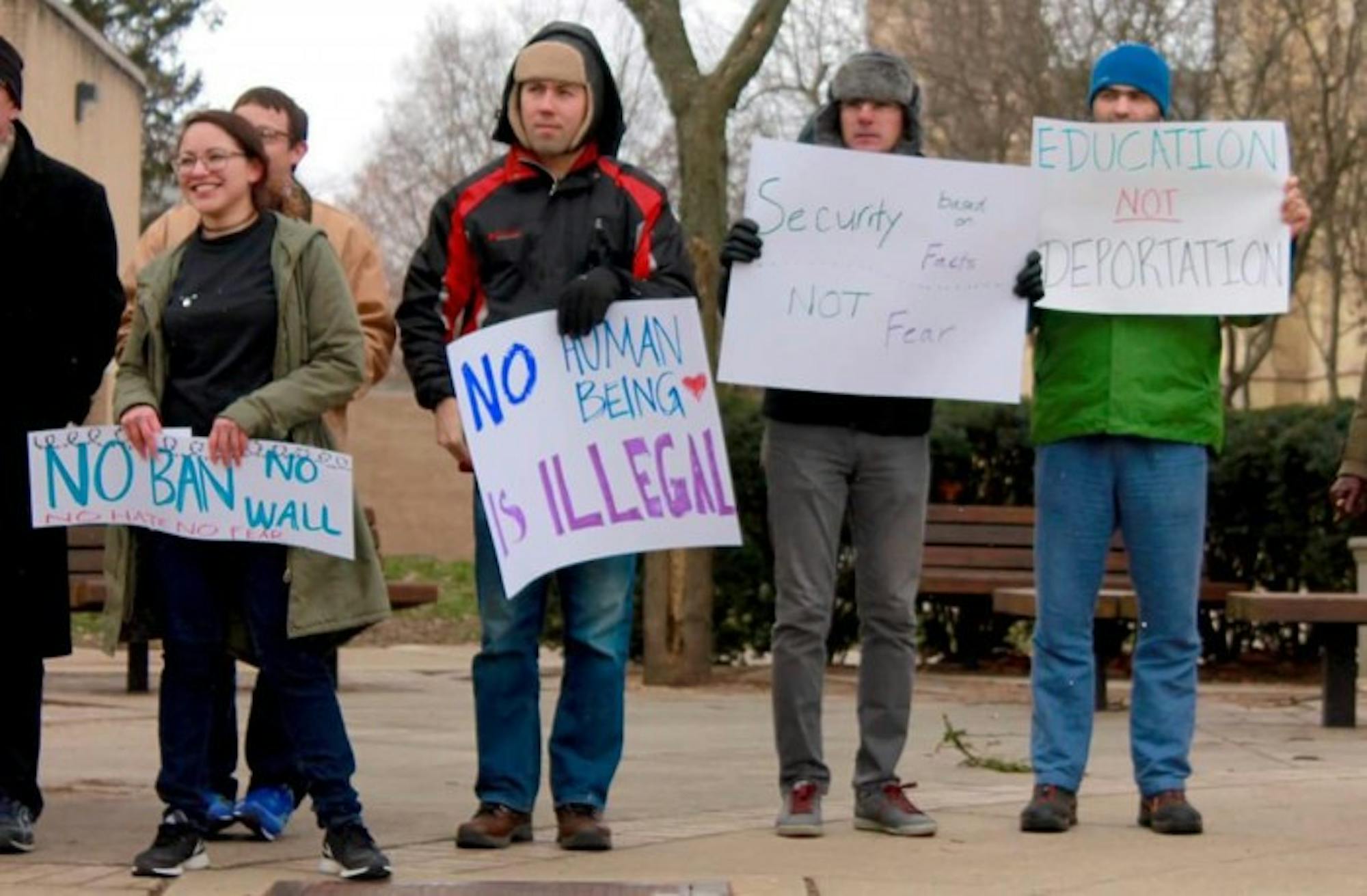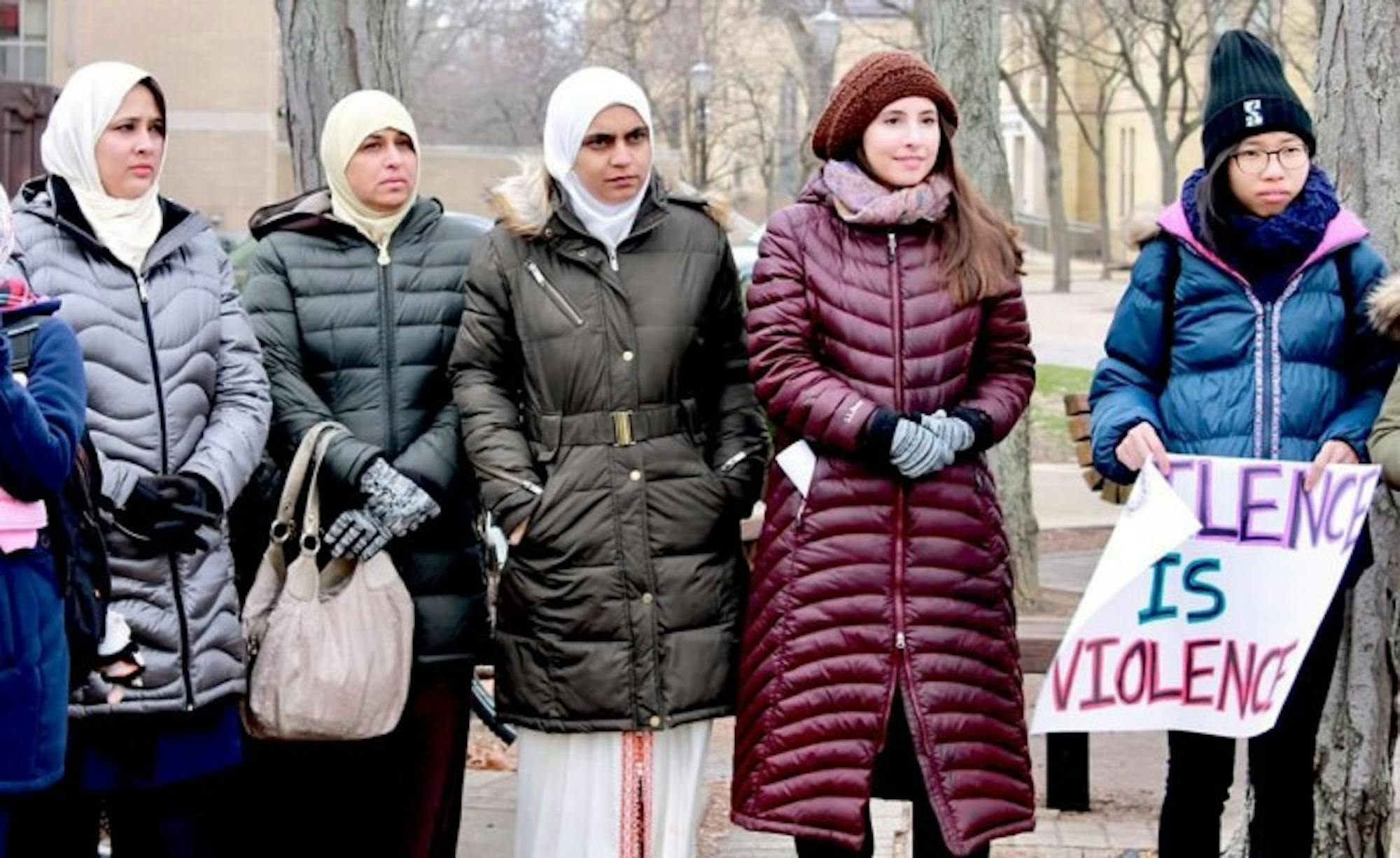Students, faculty and South Bend community members braved the 20-degree weather and gathered at Fieldhouse Mall in a peaceful protest against President Trump’s executive order that is attempting to temporarily ban the entry into the U.S. of nationals of Iraq, Iran, Syria, Sudan, Somalia, Yemen and Libya for 90 days.
Carrying signs that read “no human being is illegal” and chanting, “No hate, no fear, refugees are welcome here,” a group of around 20 students, faculty and staff marched from McKenna Hall to join a larger group huddled outside of LaFortune Student Center.
The event was organized by the We Stand For, a club dedicated to seeking social justice following the recent presidential election. The group was responsible for the silent sit-in Sanctuary Campus movement last semester, which asked University President Fr. John Jenkins to recognize a petition circulating the student body to protect Deferred Action for Childhood Arrival students and make Notre Dame a sanctuary campus.
Junior Matthew Donohue, a core member of We Stand For and an organizer of the rally, hoped to use Notre Dame’s position as a premier, Catholic institution to gain awareness for social justice issues and made it clear that We Stand For does not oppose the administration.
“We applaud the administration in coming out in strong condemnation against it … it’s been great to see Fr. Jenkins’ support especially with the Mass last Wednesday,” Donohue said. “It’s very easy to see some of these protest movements as either against the administration but this is a solidarity rally. It is nonviolent, very peaceful. This event is to complement the support that we’ve seen from the administration, from the Office of the President and the student body president very strong statements in support of the students here.”
This demonstration was part of a larger grassroots movement, Academics United, that was started by two Muslim Ph.D. students from Virginia Tech who were personally affected by the executive order, which remains on hold after a 9th U.S. Circuit Court of Appeals ruling Thursday, and asked fellow students, post-docs and employees of universities to stand with them. 
As a student of Notre Dame, a university that boasts a diverse background of professors from all over the world, Donohue said he believes that the ban — or anything that would decrease the diversity of the University — would only serve to weaken it.
“So much of our academic richness and strength comes from diversity, comes from abroad,” Donohue said. “People come to America for freedom for opportunity and freedom of expression and thought that might not be in the countries that they’re coming from. People coming from all over truly do cherish and engage in and strengthen American life, especially American academic life. This is in solidarity with students, faculty, staff.”
The rally opened with a prayer led by Imam Muhammad Sirajuddin, of the Islamic Society of Michiana.
Following an a cappella rendition of John Lennon’s “Imagine” sung by sophomore Selwin LeMont and interspersed chanting, three members of the Notre Dame academic community took the floor to share their personal perspective on the ban.
A. Rashied Omar, a scholar of Islamic studies and faculty member of the Kroc Institute for International Studies, used the word “kairos” to describe today’s political atmosphere.
“We are living through challenging times,” he said. “Kairos is a biblical term, a Greek word, which means a moment of truth. It is both a moment of crisis as well as a moment of opportunity.”
Perin Gurel, an assistant professor of American studies and concurrent assistant professor of gender studies, said she spoke from the perspective of a female Muslim immigrant with the privilege of citizenship.
“Our criticism of the ban must take into account both gender and race, as well as other structural factors, like citizenship status, national origin, sexuality, ethnicity and disability,” she said. “We must love and strengthen our communities, but we also must push against old-fashioned identity politics and towards a politics of solidarity that recognizes our differences and is informed by each other’s intersectional, historically-constituted identities and experiences.”
Lastly, Majd Alshoufi, a Master’s student in international peacebuilding and a non-Muslim Syrian human rights activist and community-based trauma therapy expert, said he realized the kindness and the power of good Muslims after an Islamic community took him in after being arrested for participating in nonviolent protests for Syrian refugees.
“Jihadist terrorism that claims the name of Islam is real and dangerous,” he said. “Second, most radical Islamic terrorists have been dying — literally — to send one very important message to the [billions of] Muslims around the world, namely that they are the real Islam and that they are the only good Muslims. ... Kind Muslims, like the ones who protected me in Turkey, are the single most important actors in the fight against terrorism.”
Following the official speakers, a diverse group of people utilized the space to share their own stories and personal statements about the executive order.
“It is critical to give a platform to the student and the faculty voice to make this issue known, to increase awareness and kind of a catharsis for people more affected by this issue to make it known to them that people stand with them,” Donohue said.
Proceeds from the event went to the Islamic Society of Michiana,a nonprofit religious organization that provides Michiana Muslims with spiritual, educational and social activities, as there is no refugee resettlement organization in South Bend. We Stand For is collecting donations via a GoFundMe page until the end of February, with the end goal of $2,000.
Donohue said he had a message for President Donald Trump.
“Show me what democracy looks like — this is what democracy looks like,” he said.
Correction: A previous version of this story incorrectly referred to We Stand For as Stand with Us. The Observer regrets this error.













